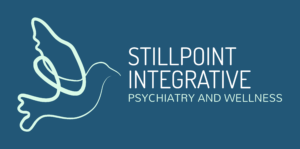Anxiety is one of the most common mental health concerns, affecting millions of people worldwide.
It can manifest as excessive worry, nervousness, restlessness, or even physical symptoms like rapid heartbeat and digestive issues.
While occasional anxiety is a normal part of life, chronic anxiety can interfere with daily activities and overall well-being.
At Stillpoint Integrative Psychiatry and Wellness, we take a holistic approach to anxiety, addressing both the mind and body to help you achieve lasting relief.
What is Anxiety?
Anxiety is the body’s natural response to stress. It is a survival mechanism that helps us stay alert in dangerous situations.
However, when anxiety becomes persistent and overwhelming, it can lead to conditions such as Generalized Anxiety Disorder (GAD), Panic Disorder, Social Anxiety Disorder, or other anxiety-related conditions.
Common symptoms of anxiety include:
- Excessive worry or fear
- Difficulty concentrating
- Irritability
- Sleep disturbances
- Muscle tension
- Racing heart or palpitations
- Digestive discomfort
The Mind-Body Connection in Anxiety
Anxiety is not just a psychological issue—it is deeply connected to our physiological health.
Factors such as nutrition, inflammation, gut health, and hormonal balance can all contribute to heightened anxiety levels.
That’s why a holistic approach is crucial in managing anxiety effectively.
1. Nutrition and Anxiety
What you eat directly impacts your brain chemistry and emotional health. Diets high in processed foods, sugar, and caffeine can contribute to increased anxiety, while nutrient-rich foods support brain function and emotional stability. Key nutrients that help regulate anxiety include:
- Omega-3 fatty acids – Found in fish, flaxseeds, and walnuts, omega-3s have been shown to reduce inflammation and improve mood.
- Magnesium – This essential mineral helps relax muscles and calm the nervous system. Foods rich in magnesium include leafy greens, nuts, and seeds.
- B vitamins – Crucial for brain function, B vitamins can be found in whole grains, eggs, and lean meats.
2. The Role of the Gut-Brain Axis
The gut and brain are closely linked through the gut-brain axis, meaning gut health directly affects mental well-being. Imbalances in gut bacteria can contribute to anxiety symptoms. Incorporating probiotics, fiber, and fermented foods like yogurt or kimchi can help restore gut balance and improve emotional resilience.
3. Sleep and Anxiety
Lack of sleep can exacerbate anxiety symptoms, making it harder to manage stress. Prioritizing good sleep hygiene can improve both physical and mental health. Strategies for better sleep include:
- Keeping a consistent sleep schedule
- Reducing screen time before bed
- Practicing relaxation techniques such as deep breathing or reading
4. Herbs and Supplements for Anxiety
Natural supplements can support the body’s ability to manage stress and anxiety. Some of the most effective options include:
- L-theanine – Found in green tea, L-theanine promotes relaxation without drowsiness.
- Ashwagandha – An adaptogenic herb that helps the body cope with stress.
- Lemon balm – Known for its calming properties, though it may not be suitable for everyone.
5. Movement and Mindfulness
Regular physical activity releases endorphins, which naturally elevate mood and reduce anxiety. Practices like yoga, stretching, and walking can help regulate stress levels. Additionally, mindfulness techniques such as deep breathing, meditation, and acupuncture can assist in managing anxiety effectively.
Pharmacological Management of Anxiety
For some individuals, medications can be a valuable tool in managing anxiety, either as a short-term aid or alongside holistic interventions. Pharmacological treatments are tailored to each individual’s needs and may include:
- Selective Serotonin Reuptake Inhibitors (SSRIs) – Commonly prescribed for generalized anxiety disorder and panic disorder, SSRIs like sertraline, fluoxetine, and escitalopram help regulate serotonin levels in the brain.
- Serotonin-Norepinephrine Reuptake Inhibitors (SNRIs) – Medications like venlafaxine and duloxetine work by increasing serotonin and norepinephrine levels to improve mood and reduce anxiety.
- Benzodiazepines – These fast-acting medications, such as lorazepam and clonazepam, are used for short-term relief of severe anxiety but are not recommended for long-term use due to the risk of dependence.
- Beta-Blockers – Propranolol and other beta-blockers can help manage the physical symptoms of anxiety, such as rapid heart rate and tremors, especially in performance or situational anxiety.
- Buspirone – A non-addictive option for generalized anxiety disorder that works by modulating serotonin levels.
- Antihistamines or Alpha-2 Agonists – Medications such as hydroxyzine or clonidine can provide relief for anxiety symptoms in certain cases.
Medication is not a one-size-fits-all approach, and at Stillpoint Integrative Psychiatry and Wellness, we carefully assess each client’s unique needs before recommending pharmacological treatment.
A Personalized Approach to Anxiety Management
At Stillpoint Integrative Psychiatry and Wellness, we understand that anxiety is complex and personal. Our approach involves looking at the whole person—mind, body, and lifestyle—to develop tailored strategies that promote long-term wellness.
Whether through targeted nutrition, lifestyle adjustments, supplements, medications, or integrative therapies, we aim to help you regain balance and peace of mind.
If you’re struggling with anxiety and looking for a holistic approach, we’re here to help. Contact us today to learn more about our integrative mental health services and start your journey to wellness.
Schedule an appointment today and take the first step toward a calmer, healthier you.
